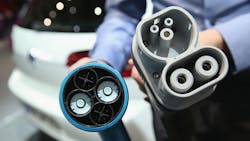Germany Plans $1.4 Billion in Incentives to Boost Electric Cars
German Chancellor Angela Merkel’s government reached a deal with automakers to jointly spend 1.2 billion euros (US$1.4 billion) on incentives to boost sluggish electric-car sales.
Buyers will be able to receive as much as 4,000 euros in rebates to help offset the higher price of an electric vehicle, Finance Minister Wolfgang Schaeuble said at a press conference in Berlin. Purchasers of hybrid cars will get as much as 3,000 euros off the price. The industry will shoulder 50% of the cost. The program is set to start in May, pending approval from the German parliament’s budget committee, he said.
“The goal is to move forward as quickly as possible on electric vehicles,” Schaeuble told reporters, adding that the aim is to begin offering the incentives next month. “With this, we are giving an impetus.”
The car industry, Germany’s biggest manufacturing sector by revenue, sees incentives as a potential game changer due to the size of the country’s market, which accounts for nearly a quarter of all auto sales across Europe. Merkel, who hinted in February that she was ready to back subsidies to reach her goal of 1 million electric cars on German streets by 2020, sealed the agreement with automotive CEOs late Tuesday after weeks of discussions over how to divide the funding. The industry originally offered to pay 25 percent of the total.
“This is a significant incentive, and it’s a good start,” said Arndt Ellinghorst, a London-based analyst at Evercore ISI. “But what needs to happen more importantly, German manufacturers need to make attractive e-cars, and German e-cars just aren’t.”
Just over 30,000 electric vehicles, which are more expensive than conventional models, have been sold in Germany. That’s a tiny fraction of the more than 3 million cars bought each year in a country which has historically leaned on diesel technology to reduce carbon-dioxide emissions.
Car manufacturers including Volkswagen AG, Daimler AG and BMW AG, along with suppliers such as Continental AG, directly employed 790,000 people in Germany last year, when industry sales totaled 404 billion euros, according to statistics from the Ministry of Transport. Production in the country rose 1.9% last year to 5.7 million cars, with models including Daimler’s Mercedes-Benz S-Class sedan, made near Stuttgart, and the Audi A3 sedan that the division of Volkswagen builds in Ingolstadt.
Automaking is “one of the key lead industries and it doesn’t help if we leave it completely on its own” in global competition, Vice Chancellor Sigmar Gabriel said at the Berlin event, comparing the electric-car incentives to the backing that European governments gave years ago to help build up Airbus Group SE. At the same time, industry leaders should “move to a much more proactive strategy, to face challenges and not always say it’s impossible,” he said.
German auto producers have pointed to support in other European countries in their efforts to sway Merkel’s government. In France, the government started offering a 10,000-euro rebate last year to drivers trading in older diesel-powered cars. In Norway, owners of electric cars enjoy a plethora of perks, including tax breaks, free battery charging, free parking and an exemption from congestion charges.
Policy Tightrope
In throwing her support behind the program, Merkel is walking a tightrope within her governing bloc. While some -- such as the head of the Christian Social Union, the Bavarian sister party to her Christian Democratic Union -- favor incentives to spur sales and create jobs, many others have opposed such measures.
The project also includes 300 million euros in German government support in the three years through 2020 to develop a network of 15,000 battery-charging stations and 100 million euros for authorities to buy electric vehicles.
“The government has put in place the right steps to give e-mobility a boost in Germany, which the country needs to catch up if it’s to become a leading market for e-cars,” said Matthias Wissmann, president of the German car-manufacturers’ association, or VDA. “That’s why construction of a nationwide charging network in step with increased sales should happen fast.”
By Hans Nichols and Birgit Jennen
About the Author
Bloomberg
Licensed content from Bloomberg, copyright 2016.
